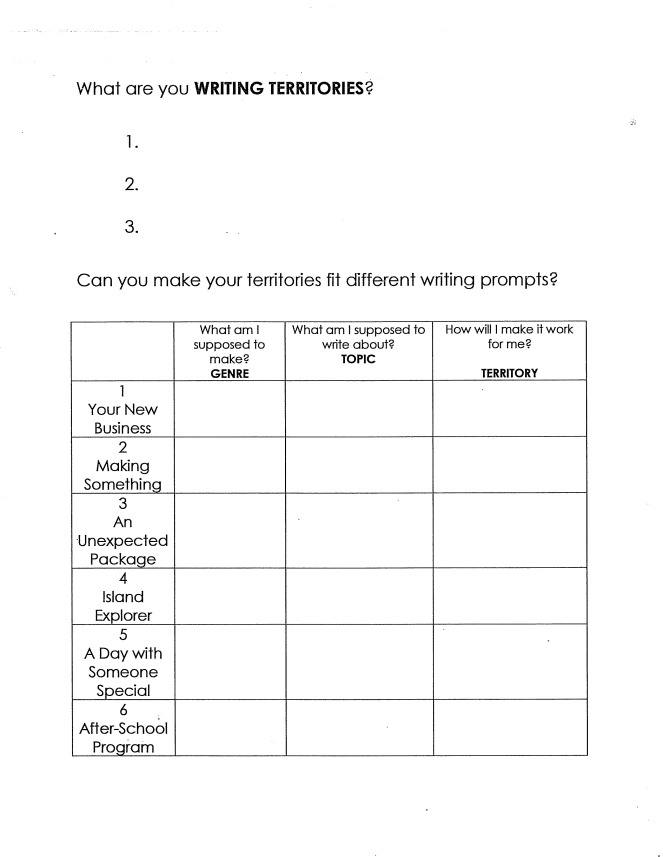One of the causes of anxiety regarding the writing prompt, is the unknown. We don’t know what genre students will be asked to write. We don’t know the topic. Test situations are stressful enough, but when we add in these unknowns, the stress levels skyrocket.
Here’s the deal, though. Students can have an idea of what they will write about on a standardized writing prompt.
When I think about my own writing life, there are topics that I return to again and again and again. In fact, the majority of my writing life deals with three writing territories (as Nancy Atwell coined them):
- Writing (reflecting on my own writing life; empowering others to write; teaching writers; ect.)
- Family (my own family stories; adoption; encouraging families)
- Ordinary events (I like to look for the ordinary moments and find big meaning in them.)
At the beginning of the year, we often help students define their writing territories. (Here is a link to an example from Stacey’s classroom in 2008, and this link will take you to an example I wrote in 2007.) We make heart or bone maps or other kinds of maps to collect territories. We help young writers fill their notebooks with possibilities for their writing lives. Then, when they prepare for a new writing project, they use their notebooks to help find ideas.
Writing for a standardized test is no different. Kids don’t have to face the test cold. By this time in the year, they know the writing territories they are most comfortable with. What if we use their territories to help ease the anxiety that comes from the unknown surrounding the writing prompt?
Today I’m going to teach into this idea in Jace Stewart’s fifth grade class. I’ll ask students to identify two or three writing territories. Then I’ll share with them how most of my writing is around a handful of territories. If I were to face a writing prompt, I would plan to write in one of my territories. This is where my comfort is as a writer.
In partners, we’ll ask students to practice this. From the Indiana Department of Education website, we are permitted to use past examples of the test via the Applied Skills examples. This is to help students understand the format of the test. For writing workshop today, will share a writing prompt example and then ask students to consider, “If given this writing prompt, can you think of a way to make it work for your territory?” This way the conversation remains on what writers do and not about preparing for a test. Below is chart to help students anchor their discussions. (We have six examples, although I’m not sure we’ll use that many.)

Work time will look a little different today. It will be based on talk — scaffolding students to envision possibilities for their writing next week. I’m less concerned about the completion of the chart and more concerned about providing ample opportunities for students to talk and envision. It is through this kind of practice they will gain confidence in developing an idea on demand in a writing prompt situation. Students will also be able to relax a little, knowing after this experience, they can depend on their writing territories to provide some comfort during a stressful writing situation.
I like helping students see how their experiences in writing workshop day in and day out are preparing them for all kinds of writing experiences, including writing on demand for a test.


I love this Idea! I’m going to use it today! Our tests start on Tuesday!
LikeLike
What I like very much is that you are helping the students see how to apply what they already know within the confines of the test. I imagine they feel great relief after the lesson. Great idea to give that support.
LikeLike
This is a fantastic idea! Our state abandoned the writing portion of the state test due to a lack of funds to grade the prompts. Your approach almost makes me miss it. (almost)
LikeLike
This idea is powerful. I shared this with a third grade class today. Throughout the class, I saw smiles replace uncertainty. Kids got it.
LikeLike
This post reminded me of something that I had forgotten about but should be mentioning with genre studies. Our state allowed us to retain copies of students’ state writing samples in order to do an optional local rater option that I ended up doing in order to compare how I scored to official state scores. As I was reading through one of the student’s writing, it struck me that she had essentially re-written a writing piece that she did in class earlier in the school year. Of course it was not exactly the same because she could not have access to her earlier writing in the testing environment, but an experience that she wrote about fit the prompt, so she chose to use it. She still gathered ideas and drafted before completing the final draft; however, the process would have been much easier because it was a topic she was familiar with. I remember being struck by how that approach made sense but I had not thought of it, and it was not a suggestion that I had mentioned in our genre prep.
LikeLike